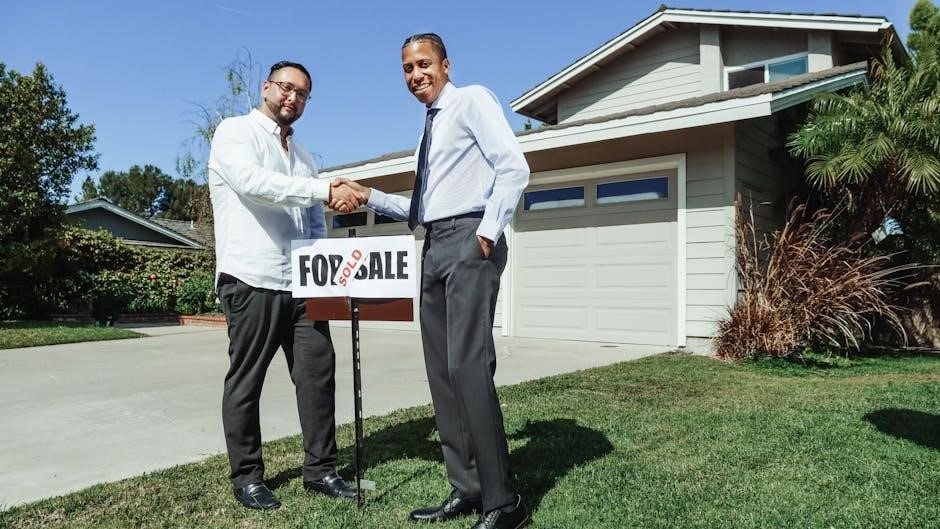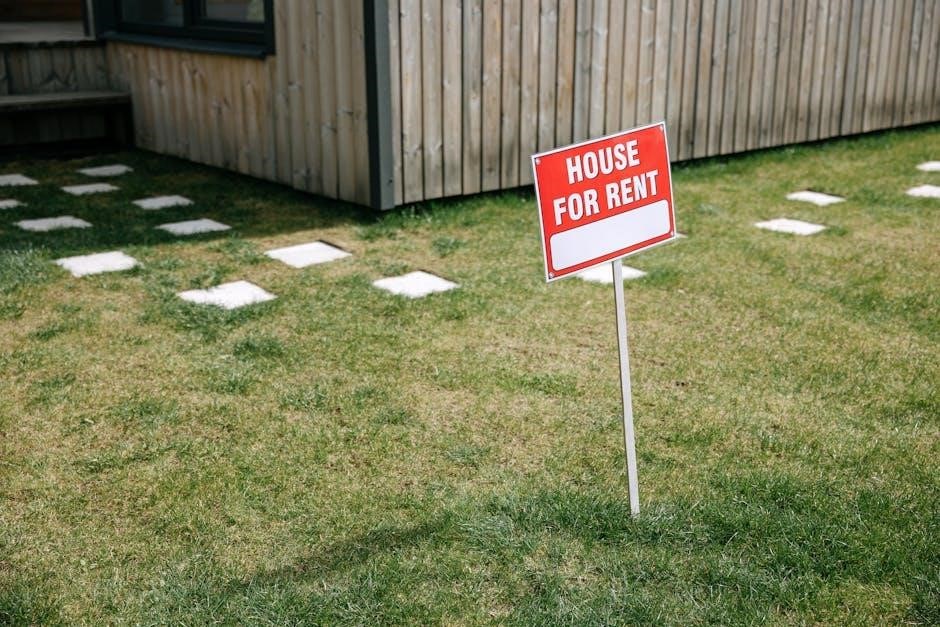A Georgia Residential Lease Agreement is a binding contract between landlords and tenants, outlining terms for renting residential properties. PDF templates provide a fillable, printable format, ensuring legal compliance and clarity for both parties involved in the tenancy.
Overview of the Lease Agreement
A Georgia Residential Lease Agreement is a legal document detailing the terms and conditions for renting residential property. It outlines rent, payment terms, utilities, and responsibilities of both landlords and tenants. The agreement ensures clarity on lease duration, renewal options, and termination procedures. It also covers property use restrictions and dispute resolution processes. By using a PDF template, users can easily customize and print the agreement, ensuring compliance with Georgia state laws and protecting the interests of all parties involved in the tenancy. This document is essential for establishing a clear understanding between landlords and tenants.
Purpose and Importance
The primary purpose of a Georgia Residential Lease Agreement is to establish a legally binding relationship between landlords and tenants. It clearly defines the rights, responsibilities, and obligations of both parties, ensuring mutual understanding and compliance. This document is crucial for protecting both parties from potential disputes by outlining rent payment terms, property use, and lease termination procedures. Using a PDF template ensures the agreement is comprehensive, enforceable, and aligned with Georgia state laws, providing a secure foundation for residential tenancy.

Types of Lease Agreements
Georgia residential leases are primarily categorized as month-to-month or fixed-term agreements. Each type offers distinct flexibility and stability for landlords and tenants, suiting different rental needs.
Month-to-Month Agreements
A month-to-month lease in Georgia offers flexibility, allowing either party to terminate with a 60-day notice. It automatically renews unless notice is given, making it ideal for short-term rentals. Tenants benefit from no long-term commitment, while landlords can adjust rent or terms more frequently. This arrangement is often preferred for temporary housing or when the rental duration is uncertain. It provides ease of modification and termination, suiting both parties seeking adaptability in their rental arrangement.
Fixed-Term Agreements
A fixed-term lease in Georgia specifies a definite duration, such as 12 months, with clear start and end dates. It offers stability for both landlords and tenants, ensuring predictable terms and rent for the lease period. The agreement automatically expires at the end of the term unless renewed or extended. This type of lease is ideal for tenants seeking long-term housing stability and landlords preferring consistent rental income without frequent tenant changes or rent adjustments.
Key Components of a Lease Agreement
A Georgia residential lease agreement outlines rent, payment terms, security deposits, lease duration, tenant responsibilities, and landlord obligations, ensuring clarity and compliance with state laws.
Rent Details and Payment Terms
A Georgia residential lease agreement must clearly outline rent details, including the amount, due date, and accepted payment methods. It should specify whether utilities or amenities are included. Late payment fees and grace periods, as allowed by Georgia law, must be defined. Tenants should receive receipts for payments, and landlords must disclose any charges for unpaid rent. This section ensures both parties understand their financial obligations, promoting clarity and preventing disputes over rent-related matters. Compliance with state laws is essential to avoid legal issues.
Security Deposit Requirements
In Georgia, landlords may charge a security deposit, but there is no state-imposed cap on the amount. The lease should detail how the deposit will be used, typically for damages or unpaid rent. Georgia law requires landlords to return the deposit within one month of the tenant moving out, provided there are no deductions. The lease must outline the process for deductions and returns, ensuring transparency. This section protects both parties by clarifying expectations and legal obligations regarding the security deposit. Proper documentation is essential to avoid disputes.
Lease Duration and Expiry
In Georgia, a residential lease agreement specifies the duration of the tenancy, which can be fixed-term or month-to-month. Fixed-term leases expire at the end of the agreed period, while month-to-month leases continue indefinitely until terminated. Landlords or tenants must provide at least 60 days’ notice to terminate or renew a month-to-month lease. The lease should outline whether it automatically renews or requires a new agreement. If no action is taken, the lease expires, and the tenant must vacate unless a renewal is negotiated. Proper notice is legally required to avoid disputes. Always document expiry terms clearly in the lease. Tenants must vacate by the expiry date to avoid legal issues. Failure to comply may result in unlawful detainer actions. Ensure all expiry details align with Georgia state laws to maintain compliance. Clear expiry terms protect both parties’ rights and prevent misunderstandings. Never assume expiry automatically renews the lease without written agreement. Always review expiry clauses carefully before signing. Ensure the lease specifies what happens at expiry to avoid confusion. Properly handling lease expiry is crucial for a smooth transition. Tenants and landlords must adhere to expiry terms to maintain legal compliance. Always keep a record of expiry-related communications. Expiry terms should be fair and transparent for both parties. Understand expiry procedures to avoid potential legal disputes. Always follow Georgia state laws regarding lease duration and expiry. Properly executed expiry terms ensure a seamless end to the tenancy. Tenants and landlords must respect the agreed expiry date. Failure to do so can lead to legal consequences. Always ensure expiry terms are clear and legally binding. Expiry clauses must comply with Georgia’s landlord-tenant laws. Tenants should review expiry terms carefully before signing. Landlords must provide proper notice before expiry if they intend to terminate. The lease should outline all expiry-related responsibilities. Always document expiry terms to avoid future conflicts. Expiry terms are essential for a well-structured lease agreement. Properly handling lease expiry ensures a smooth transition for both parties. Always ensure expiry terms are fair and legally sound. Tenants and landlords must adhere to expiry terms to maintain a positive relationship. Expiry terms should be clearly stated in the lease agreement. Always follow Georgia state laws when dealing with lease expiry. Properly executed expiry terms protect both parties’ rights. Tenants must vacate by the expiry date unless a renewal is agreed upon. Landlords must provide proper notice if they intend to terminate the lease at expiry. Expiry terms should be reviewed and understood by both parties. Always ensure expiry terms are legally compliant and fair. Properly handling lease expiry is crucial for a successful tenancy. Tenants and landlords must respect the agreed expiry terms. Failure to comply can lead to legal consequences. Always document expiry terms clearly in the lease agreement. Expiry terms are essential for a well-structured and legally binding lease. Properly executed expiry terms ensure a smooth transition for both parties. Always ensure expiry terms are fair and legally sound. Tenants and landlords must adhere to expiry terms to maintain a positive relationship; Expiry terms should be clearly stated in the lease agreement. Always follow Georgia state laws when dealing with lease expiry. Properly executed expiry terms protect both parties’ rights. Tenants must vacate by the expiry date unless a renewal is agreed upon. Landlords must provide proper notice if they intend to terminate the lease at expiry. Expiry terms should be reviewed and understood by both parties. Always ensure expiry terms are legally compliant and fair. Properly handling lease expiry is crucial for a successful tenancy. Tenants and landlords must respect the agreed expiry terms. Failure to comply can lead to legal consequences. Always document expiry terms clearly in the lease agreement. Expiry terms are essential for a well-structured and legally binding lease. Properly executed expiry terms ensure a smooth transition for both parties. Always ensure expiry terms are fair and legally sound. Tenants and landlords must adhere to expiry terms to maintain a positive relationship. Expiry terms should be clearly stated in the lease agreement. Always follow Georgia state laws when dealing with lease expiry. Properly executed expiry terms protect both parties’ rights. Tenants must vacate by the expiry date unless a renewal is agreed upon. Landlords must provide proper notice if they intend to terminate the lease at expiry. Expiry terms should be reviewed and understood by both parties. Always ensure expiry terms are legally compliant and fair. Properly handling lease expiry is crucial for a successful tenancy. Tenants and landlords must respect the agreed expiry terms. Failure to comply can lead to legal consequences. Always document expiry terms clearly in the lease agreement. Expiry terms are essential for a well-structured and legally binding lease. Properly executed expiry terms ensure a smooth transition for both parties. Always ensure expiry terms are fair and legally sound. Tenants and landlords must adhere to expiry terms to maintain a positive relationship. Expiry terms should be clearly stated in the lease agreement. Always follow Georgia state laws when dealing with lease expiry. Properly executed expiry terms protect both parties’ rights. Tenants must vacate by the expiry date unless a renewal is agreed upon. Landlords must provide proper notice if they intend to terminate the lease at expiry. Expiry terms should be reviewed and understood by both parties. Always ensure expiry terms are legally compliant and fair. Properly handling lease expiry is crucial for a successful tenancy. Tenants and landlords must respect the agreed expiry terms. Failure to comply can lead to legal consequences. Always document expiry terms clearly in the lease agreement. Expiry terms are essential for a well-structured and legally binding lease. Properly executed expiry terms ensure a smooth transition for both parties. Always ensure expiry terms are fair and legally sound. Tenants and landlords must adhere to expiry terms to maintain a positive relationship. Expiry terms should be clearly stated in the lease agreement. Always follow Georgia state laws when dealing with lease expiry. Properly executed expiry terms protect both parties’ rights. Tenants must vacate by the expiry date unless a renewal is agreed upon. Landlords must provide proper notice if they intend to terminate the lease at expiry. Expiry terms should be reviewed and understood by both parties. Always ensure expiry terms are legally compliant and fair. Properly handling lease expiry is crucial for a successful tenancy. Tenants and landlords must respect the agreed expiry terms. Failure to comply can lead to legal consequences. Always document expiry terms clearly in the lease agreement. Expiry terms are essential for a well-structured and legally binding lease. Properly executed expiry terms ensure a smooth transition for both parties. Always ensure expiry terms are fair and legally sound. Tenants and landlords must adhere to expiry terms to maintain a positive relationship. Expiry terms should be clearly stated in the lease agreement. Always follow Georgia state laws when dealing with lease expiry. Properly executed expiry terms protect both parties’ rights. Tenants must vacate by the expiry date unless a renewal is agreed upon. Landlords must provide proper notice if they intend to terminate the lease at expiry. Expiry terms should be reviewed and understood by both parties. Always ensure expiry terms are legally compliant and fair. Properly handling lease expiry is crucial for a successful tenancy. Tenants and landlords must respect the agreed expiry terms. Failure to comply can lead to legal consequences. Always document expiry terms clearly in the lease agreement. Expiry terms are essential for a well-structured and legally binding lease. Properly executed expiry terms ensure a smooth transition for both parties. Always ensure expiry terms are fair and legally sound. Tenants and landlords must adhere to expiry terms to maintain a positive relationship. Expiry terms should be clearly stated in the lease agreement. Always follow Georgia state laws when dealing with lease expiry. Properly executed expiry terms protect both parties’ rights. Tenants must vacate by the expiry date unless a renewal is agreed upon. Landlords must provide proper notice if they intend to terminate the lease at expiry. Expiry terms should be reviewed and understood by both parties. Always ensure expiry terms are legally compliant and fair. Properly handling lease expiry is crucial for a successful tenancy. Tenants and landlords must respect the agreed expiry terms. Failure to comply can lead to legal consequences. Always document expiry terms clearly in the lease agreement. Expiry terms are essential for a well-structured and legally binding lease. Properly executed expiry terms ensure a smooth transition for both parties. Always ensure expiry terms are fair and legally sound. Tenants and landlords must adhere to expiry terms to maintain a positive relationship

Legal Requirements and Disclosures
Georgia residential lease agreements must comply with state laws and local ordinances, including necessary disclosures and adherence to rental regulations to ensure legal compliance and tenant protections.
Necessary Disclosures by Landlords
Landlords in Georgia must provide specific disclosures in the lease agreement, including the condition of the property, any known defects, and the identity of the property owner. They must also disclose lead-based paint hazards if applicable, asbestos or mold issues, and any shared utility arrangements. Additionally, landlords must comply with Georgia’s landlord-tenant laws, ensuring the property meets safety and health standards. Failure to provide required disclosures can result in legal consequences, emphasizing the importance of transparency and compliance in the lease document.

The Process of Creating a Lease Agreement
Drafting a lease involves outlining terms, conditions, and tenant responsibilities. Using templates ensures compliance with Georgia laws and streamlines the process efficiently.
Using Templates for Efficiency
Using templates for Georgia residential lease agreements streamlines the creation process, ensuring compliance with state laws. Templates include pre-drafted clauses for rent, security deposits, and tenant responsibilities, saving time. They reduce legal risks by incorporating necessary disclosures and adhering to Georgia-specific regulations. Both landlords and tenants benefit from clear, standardized terms. Templates are easily customizable to fit specific situations, providing a balance between efficiency and personalization. This approach minimizes errors and ensures all parties understand their obligations from the start.
Tenant Responsibilities
Tenants must pay rent timely, maintain the property, avoid unauthorized modifications, and comply with all lease terms and applicable laws in Georgia.
Primary Obligations
Tenants in Georgia are primarily obligated to pay rent on time, maintain the property, and comply with all lease terms. They must avoid unauthorized modifications and ensure the property remains safe and clean. Compliance with local laws and regulations is mandatory. Tenants should also refrain from engaging in illegal activities on the premises. Fulfilling these obligations ensures a harmonious relationship with the landlord and prevents potential legal issues.

Landlord Responsibilities
Landlords in Georgia must maintain the property, ensure habitability, and comply with safety standards. They are responsible for necessary repairs and must provide proper documentation.
Key Duties and Liabilities
Landlords in Georgia must ensure the rental property is habitable and complies with safety and health codes. They are responsible for maintaining structural integrity, plumbing, and electrical systems. Key duties include addressing necessary repairs promptly and providing written notice for rent increases or lease termination. Landlords are also liable for failing to disclose required information, such as the presence of lead paint or flood zones. They must avoid retaliatory actions against tenants and adhere to fair housing laws to prevent legal consequences. Proper documentation is essential to protect their rights and fulfill obligations effectively.
Understanding Lease Termination
Proper lease termination in Georgia requires following lease terms and state laws. Fixed-term leases end automatically, while month-to-month tenancies need a 60-day notice. Ensure compliance to avoid legal issues.
Proper Procedures
In Georgia, lease termination must follow strict procedures. For month-to-month agreements, either party must provide a 60-day written notice. Fixed-term leases automatically end unless renewal is agreed upon. Landlords must deliver notices via certified mail or hand delivery, ensuring proof of receipt. Tenants must vacate by the lease end date to avoid holdover charges. Failure to comply with termination procedures can lead to legal disputes or financial penalties. Always review Georgia state laws and consult legal advice to ensure compliance with proper termination protocols.

The Eviction Process
Legal Steps and Considerations
The eviction process in Georgia requires landlords to provide proper notice, file a lawsuit, obtain a court judgment, and execute a writ of possession through law enforcement.
In Georgia, evictions require strict adherence to legal procedures. Landlords must first provide a 60-day notice to terminate the lease or a 30-day notice for non-payment of rent. If the tenant fails to vacate, the landlord must file an eviction lawsuit in court, serving the tenant with a summons. The tenant has seven days to respond. If the court rules in favor of the landlord, a writ of possession is issued, allowing law enforcement to remove the tenant. Landlords must avoid self-help evictions, as they are illegal in Georgia. Proper documentation and legal compliance are crucial to avoid delays or dismissal of the case. Consulting an attorney is recommended to ensure all steps are followed correctly.

PDF Templates and Their Usefulness
PDF templates ensure consistency, professionalism, and accessibility. They maintain formatting across devices, supporting electronic signatures for efficient lease agreements. Ideal for Georgia residential lease agreements.
Advantages of Using PDF Formats
PDF formats offer enhanced security, ensuring lease agreements cannot be altered without authorization, preserving the integrity of the contract. They are universally compatible, accessible on all devices, and maintain consistent formatting. PDFs provide a professional appearance, essential for legal documents like Georgia residential lease agreements. Additionally, they support electronic signatures, streamlining the signing process. Their reliability and widespread acceptance make PDFs a preferred choice for landlords and tenants, ensuring clarity and enforceability under Georgia law.

Georgia-Specific Laws
Georgia-specific laws regulate security deposits, eviction processes, and required disclosures, ensuring compliance and preventing disputes while balancing tenant and landlord rights under state regulations.
State Regulations and Compliance
Georgia lease agreements must comply with state laws, including the Georgia Landlord-Tenant Act. Landlords are required to disclose specific information, such as the condition of the property and the presence of lead paint. Security deposit rules are strictly regulated, limiting the amount and outlining refund procedures. Eviction processes must follow legal steps, ensuring tenants receive proper notice. Compliance with these regulations is essential to avoid legal disputes and ensure enforceability of the lease agreement under Georgia law.

Common Mistakes to Avoid
- Unclear lease terms leading to disputes.
- Insufficient tenant screening processes.
- Failure to document property condition.
- Neglecting to follow eviction procedures.
pitfalls for Landlords and Tenants
Pitfalls for Landlords and Tenants
Common mistakes include landlords failing to properly screen tenants or document property conditions, leading to potential disputes. Tenants may overlook lease terms, resulting in unintended violations. Both parties risk legal issues if eviction procedures aren’t followed or lease obligations are ignored. Ensuring clear communication and thorough documentation is essential to avoid costly misunderstandings and legal complications for all involved in a Georgia residential lease agreement.
Electronic Signatures
Electronic signatures are legally valid in Georgia under the E-SIGN Act, offering convenience and speed for lease agreements. They eliminate paperwork and provide secure digital storage;
Legality and Implementation
In Georgia, electronic signatures are legally recognized under the E-SIGN Act, making them enforceable for lease agreements. Landlords and tenants can use digital tools like DocuSign or Adobe Sign to execute agreements securely. Ensure the platform adheres to federal and state regulations for authenticity. Both parties should retain copies of the signed document for records. Implementing electronic signatures streamlines the process, reduces paperwork, and provides a legally binding agreement. Consulting legal counsel ensures compliance with Georgia’s specific requirements.
Lease Renewal Process
Lease renewal involves negotiating new terms, rent adjustments, and signing a new agreement. Both parties must agree in writing before the current lease expires.
Procedures and Negotiations
Lease renewal procedures involve mutual agreement between landlord and tenant. Negotiations may include rent adjustments, lease term extensions, or changes in responsibilities. Both parties must review and sign a new agreement. Landlords typically notify tenants of renewal options 30–60 days before expiry. Tenants may request modifications, such as pet policies or renovations. Legal requirements ensure transparency, and written documentation is essential. Negotiations should reflect fair terms, balancing tenant needs and landlord interests. Proper communication and timely action are crucial to avoid vacancy or disputes. A clear, updated lease ensures continued occupancy under agreed conditions.

Amendments to the Lease
Amendments modify the lease terms post-signing. Changes, like rent adjustments or responsibility shifts, require written agreement. Both parties must consent and sign the updated document.
How and When to Make Changes
Amendments to a Georgia residential lease agreement must be made in writing to ensure clarity and legal validity. Changes should be proposed in advance, with both parties agreeing to the terms. Common reasons for amendments include rent adjustments, lease duration extensions, or alterations to tenant responsibilities. The revised agreement should be drafted clearly, specifying the changes and maintaining the original lease’s core terms. Both landlord and tenant must sign the amended document for it to take effect. Verbal agreements are insufficient and may lead to disputes.
